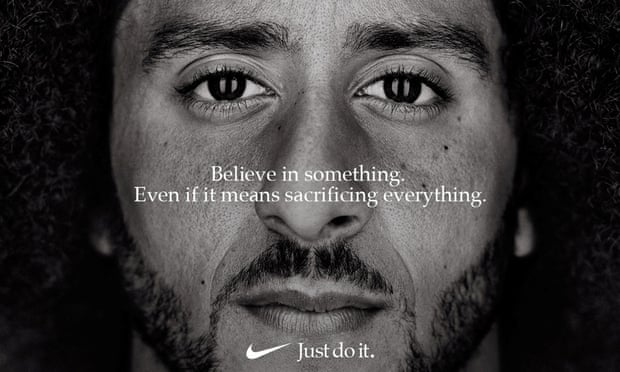WORLDVIEW; Nike ad campaign -Activism or capitalism?

Gil Scott-Heron famously noted that the revolution would not be right back after a message, would not go better with Coke, and certainly would not be televised. It now appears, if Nike’s current advertising campaign is to be believed, that the revolution comes embossed with a Swoosh write Ben Carrington and Jules Boykoff in The Guardian on Sep.6
On Monday the famously underemployed NFL player Colin Kaepernick tweeted a black and white image of his face, his eyes staring at us, with the words “Believe in something, even if it means sacrificing everything” etched over the top. Below sits Nike’s Swoosh. The campaign celebrates the 30th anniversary of arguably the most famous advertising slogan in sports – Just do it. Kaepernick’s deal with Nike will allow him to continue his empowering community and youth activism work, such as his Know Your Rights camp. In this light, Kaepernick might be seen as a modern-day Robin Hood.
But is the Nike-Kaepernick partnership a harbinger of 21st-century activism, or a case study in capitalist co-option?
To be sure, Nike is riding the zeitgeist of athlete activism, not creating it. We’re in the throes of what the scholar-activist Harry Edwards has called a “fourth wave of athlete activism”. This is undoubtedly an exciting era of cross-sport solidarity, with LeBron James cheering on track star Caster Semenya and Kaepernick rooting for Serena Williams. James and Williams – themselves Nike-endorsed athletes – have been vocal in support of Kaepernick’s cause.
Nike may be amplifying a courageous voice of dissent, but we should also recognize that it’s in its economic interest to do so. After all, Nike’s core customers are young and more racially diverse than previous generations, with almost two in three who don the Swoosh being younger than 35. Notwithstanding a one-day fall in its stock market value, to embrace Kaepernick as a spokesperson is to make a shrewd longer-term business move.
Despite this, the furor around Kaepernick’s sponsorship deal was intense and predictable in equal measure. The hashtags #BoycottNike and #JustBurnIt trended on Twitter, as social media was filled with videos and images of overwhelmingly white Americans of the Trumpenproletariat burning their Nike gear, slicing off their Swooshes. Conservatives predictably wrapped themselves in the comforting blanket of nationalistic militarism, and fashioned memes juxtaposing military personnel with Kaepernick, suggesting that real sacrifice was to be found in the streets of Falluja and Helmand province.
President Trump, of course, weighed in on Twitter: “Just like the NFL, whose ratings have gone WAY DOWN, Nike is getting absolutely killed with anger and boycotts. I wonder if they had any idea that it would be this way? As far as the NFL is concerned, I just find it hard to watch, and always will, until they stand for the FLAG!” The unindicted co-conspirator in chief also told the far-right website the Daily Caller that the Nike-Kaepernick partnership was “a terrible message and a message that shouldn’t be sent”.
By signing up Kaepernick, who it turns out had kept his endorsement deal despite not playing, Nike continued its mythic tradition of appearing countercultural, rebellious and anti-establishment while the company’s own practices belie its claimed progressive credentials. As the journalist, Dave Zirin noted: “Nike has used the image of rebellion to sell its gear, while stripping that rebellion of all its content.”
Yet, amid all the debate and discussion this week, a key element has been overshadowed: class politics. Nike rarely addresses issues around class, which is not surprising since Nike has an appalling history of labour rights violations in the 300-plus factories in nearly 40 countries around the world where its products are made. Nike has also been exposed for fostering a sexist work environment that included discrimination and harassment towards women.
In this context it is worth reminding ourselves that Kaepernick is currently involved in a labor dispute with the NFL, a collusion grievance in which he alleges NFL owners have effectively conspired to keep him from playing because of his activism. (Meanwhile, and often overlooked, his former teammate, faithful supporter and fellow activist Eric Reid has still not been signed by an NFL team for the 2018 season).
Kaepernick often invokes the history and legacy of the radical black tradition, from WEB Du Bois to Angela Davis. But that tradition grounded its rightful critique of white supremacy and racial subjugation in an understanding of capitalism’s awesome and destructive power, alongside a commitment to socialism. This is not to accuse Kaepernick of selling out or to suggest that he is not sincere in his political convictions. He has suffered more than any other athlete in recent times for merely exercising his right to speak out on social justice issues. It is, instead, to acknowledge the limitations of any radical politics whether in the sports arena or more widely, that is divorced from a critique of capitalism and a socialist alternative. It is also a reminder that late-modern capitalism can embrace and even promote radical, chic rhetoric as long as it does not call into question the ideology of capitalism itself.
Make no mistake, the pressures on black athletes and others standing in solidarity are as great as they’ve ever been. Despite what the right alleges, their sacrifices are real. Those courageous enough to speak out against the status quo and conservative orthodoxies do so at a time where the president of the United States will personally attack anyone not supine enough to engage in paid patriotism and shallow nationalism.
The question now is whether those who have bravely taken a stand, or a knee, in the cause of social justice are also willing to speak out when it comes to the systemic conditions of economic exploitation that are intimately interconnected with those very same issues. Linking, for example, racist policing practices and the hyper-incarceration rates of African Americans to the capitalist state that enacts these neoliberal policies in the first place.
For those athletes wanting to do so but fearful of the consequences, there may never be a more propitious moment to act with conscience and conviction. As Nike might say, just do it.
- Ben Carrington is an associate professor of sociology and journalism in the Annenberg School for Communication and Journalism, University of Southern California; Jules Boykoff is an associate professor of political science at Pacific University in Oregon and a former professional soccer player





